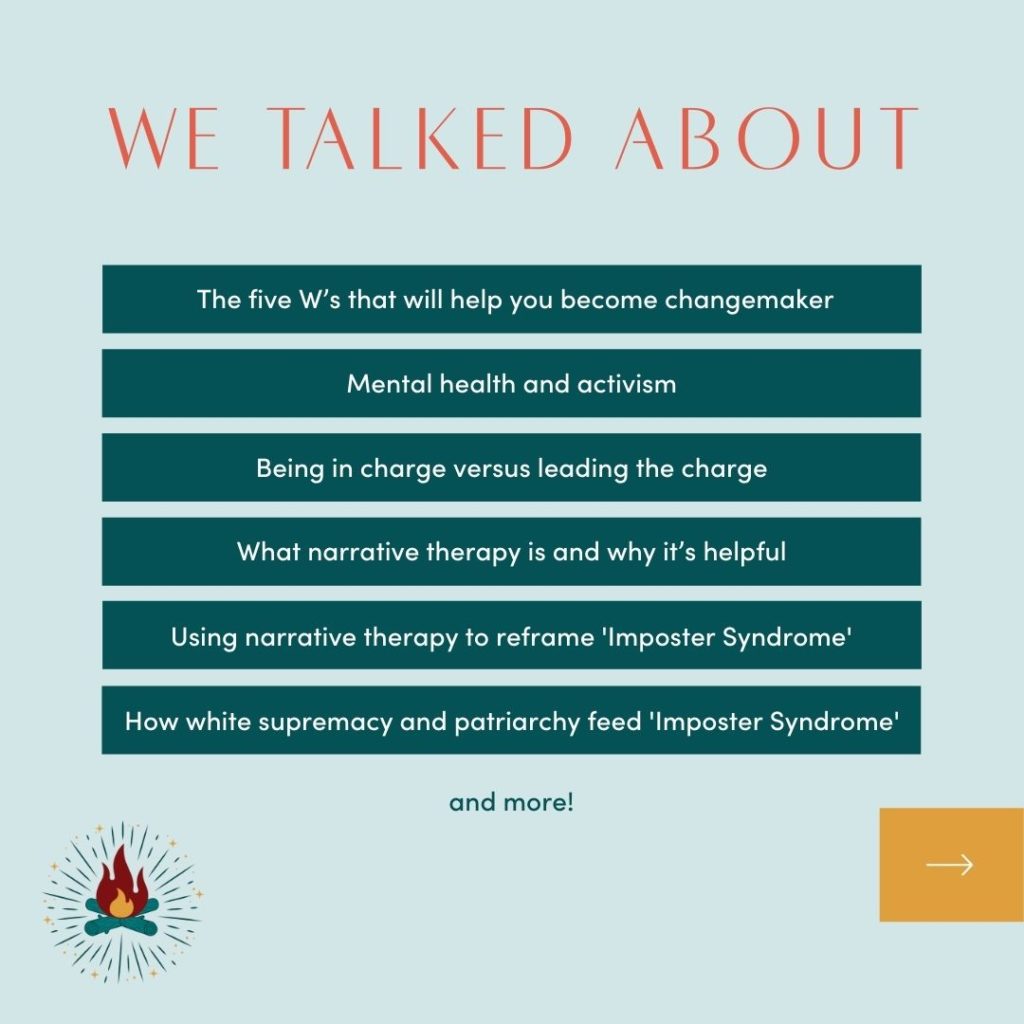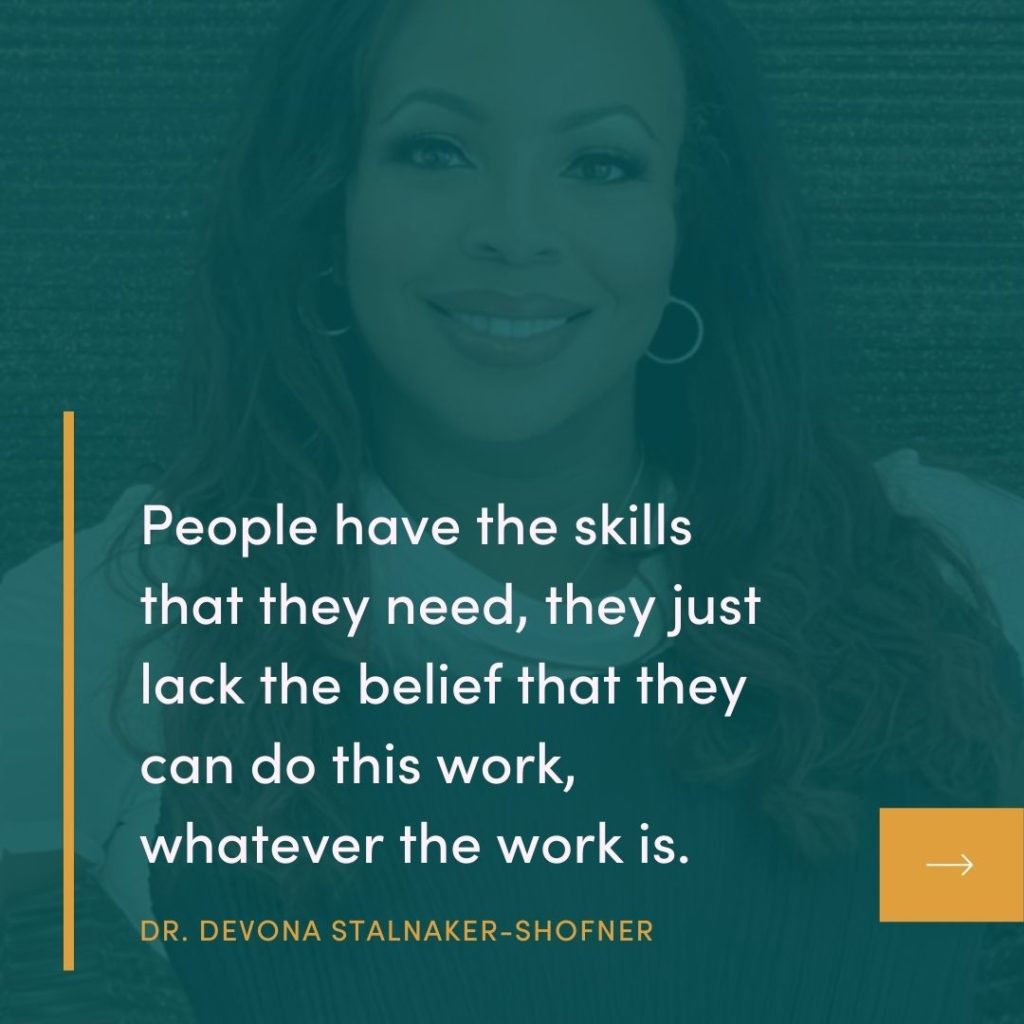Dr. Devona Stalnaker-Shofner is a professor at Antioch University New England, licensed counselor and keynote speaker who is committed to equity and justice in mental health. We’re diving deeper into narrative therapy, and how it can be the key to disengaging from toxic narratives to rewrite our own empowering story as changemakers.
“I think imposter syndrome is an extension of white supremacy and patriarchy. That’s why we have to do the work to dismantle it within ourselves before we can dismantle it within the system.” – Dr. Devona Stalnaker-Shofner
Highlights from the podcast episode:

[07:10] How to nurture future social-changing agents
Something I focus on is helping students develop a level of social consciousness. Part of that is helping them to think about their own work. Before you can give to the community, you have to do your own work. I encourage people to do their work around social justice, activism and advocacy.
And what does that look like for them? That could be going to different lectures, listening to podcasts, it could be reading books, it could be attending workshops and seminars. It’s really, very open-ended on all the things that you can do. I think the point is that you’re searching for knowledge, you’re searching for awareness, and you’re searching for your purpose.
[09:12] The five W’s that will help you become a changemaker
- So, who are you? Who are you wanting to become as an advocate?
- What is your purpose?
- When will you begin the work?
- Where do you need to start? Do you need to start with yourself? Do you need to start with your clients? Do you need to start with your family? Do you need to start in your community? Where does the work need to happen?
- And then lastly, and I think the most salient question is, why is this work important to you?
[11:00] Mental health and activism
“The most important field of activism, particularly for black people, is mental health. Activism does not need to be some kind of organized ‘against’ protest. When my students say they want to change the world, I espouse an inward to outward movement. If you feel that you can’t do shit about your own reality, how can you really think you could change the world? And guess what? When you’re fucked-up and you lead the revolution, you are probably going to get a pretty fucked-up revolution.” – bell hooks
Who could say it more eloquently than bell hooks? It really can be like the blind leading the blind, if you have no sense of purpose, no direction, no focus, no goal, no drive, or real meaningful contribution. That’s why you have to do your work to tap into those things that are essential.
You do the work to keep you focused and grounded. Because this work is hard. It’s challenging. There are lots of disappointments. There are lots of frustrations and setbacks. Think about just recently with the Kyle Rittenhouse verdict setback. Your purpose and vision are the things that keep you when you have those setbacks. The mission is bigger than just one moment.
[13:54] Being in charge versus leading the charge
Who do I need to become? How can I best get it done, right? We often gloss over these big strategic questions, because the day to day gets in the way. But those are the foundations to activating movements.
When I think about people in leadership, I think about the importance of servant leadership and being able to minister to your community in a very collaborative way. You’re not exercising dominion over anyone, but working in concert and creating the reality that you want to see in your organization. That’s something that people miss the mark on when they’re so focused on being in charge, that they’re not leading the charge.
Part of that antiquated mentality around leadership comes from the system and culture of white supremacy and patriarchy. I want people to begin to understand that that is not a successful or sustainable model of leadership. Instead, you have to work in concert with the people who are under your charge, to be able to accomplish the mission that is set forth before you in your organization, in your workplace, wherever you are, and wherever you have an opportunity to lead and serve.
[15:28] What narrative therapy is and why it’s helpful
Narrative therapy is a form of psychotherapy. It’s working with a client or patient to help them identify their values and help them hone in on the skills that are associated with those values. So, it’s a way of helping clients to understand who they are and what they bring to the table. It helps them look at their current problems in a more holistic way. And in a deconstructed way, if that makes sense.
Narrative therapy also is a socially just approach to therapy because it really does seek to dismantle the dominant narrative and help the client understand their personal narrative, their personal story, and how those stories can lead to their own empowerment. So often, clients initially think of themselves through a shame-based lens. And they’re often an actor in their narrative. What I’m trying to do with narrative therapy is to help them to not be an actor, because actors are powerless. They just do the role that’s given to them.
The real power is in the storytelling and in the direction of the story. Being the author or the director of their lives is more empowering, as opposed to feeling that something is happening to you and you have no control or agency over it.
[18:45] Using narrative therapy to reframe Imposter Syndrome
I surprisingly struggle with imposter syndrome myself. I don’t remember that being an issue earlier in my career. I think it was something that happened after I graduated with my doctorate and started teaching. There was this sense that I needed to be more than what I was, and that what I was wasn’t good enough. So I really understand imposter syndrome.
What I have been trying to do with myself, is really understanding my identity and purpose, and focusing on how I can be more of an active participant to reshape the story. So instead of telling myself that I’m not worthy of the opportunity to speak in front of people, or that I’m not worthy of a publication, I’m instead able to say that this is part of my journey and part of my growth. It’s an opportunity for me to give and to serve in a meaningful way – instead of thinking about how I may not measure up.
Helping people to re-author their story is an intervention used in narrative therapy. It helps patients figure out who they are, what their identity is, find power in that narrative, understand what’s important to them, what is most meaningful about their journey, and to live in the positive of the things that make them who they are, as opposed to the things that they’re not.
[22:22] How white supremacy and patriarchy feed Imposter Syndrome
Something that just kind of clicked in my mind is that the imposter syndrome didn’t happen for me until I started teaching at a predominantly white institution. Being steeped in that white supremacist, patriarchal, antiquated thinking, and feeling like a mismatched cog in the system definitely added to those feelings.
I think about Ibram X. Kendi work, “How To Be An Antiracist.” One of the things that stuck out for me was that we are all indoctrinated with white supremacy and patriarchy. That’s why we have to do the work to dismantle it within ourselves first before we can dismantle it within the system. I share that because I think imposter syndrome is an extension of white supremacy and patriarchy.
That’s the work that has to happen internally for us to dismantle that and disengage from that toxic narrative and be able to rewrite our story (with us in control, and in a more empowered position.)
[24:40] A tool to dismantle and metabolize Imposter Syndrome
There’s an intervention called the Remembering practice. Your identity is an extension of your purpose, and that remembering allows you to draw closer to yourself. One tool you can do is to write your story, as you see it currently. Then write your story as you want to see it, as you believe it needs to be, or that you want it to be.
One is a story about who you are. And then the other is the story about who you’re becoming. Then think about the practical steps you need to take to become the person that you wrote about. And surprisingly, people always find that they have the skills that they need, they just lack the belief that they can do the work. I think that’s a really significant way of dismantling imposter syndrome.
[29:45] Devona’s vision of equity and justice around access to mental health services
What’s important to me is equity and justice, particularly around access to mental health services. African Americans, or Black identifying persons make up 13% of the US population but they’re 20% more likely to have issues related to chronic mental health conditions like depression, anxiety disorders, and substance use. Some of the contributing factors have to do with intergenerational and historical racial trauma.
So, I want to level the playing field so that people who are marginalized and disenfranchised have access to services to find their wholeness, wellness, and be able to find a community that will hold them in those moments when things feel like they’re about to fall apart. Mybig, beautiful vision for the world is equity around social services like mental health, and being able to provide those services myself.
I’m also a practitioner – I have a private practice. I have clients that are self-pay, and they make it easier for me to do pro bono work because that cost is offset for someone who may not be able to afford services. I think that there are very concrete ways that we can effectuate change. But we have to be willing to do the work and we have to be willing to see past the barriers and the obstacles to move in a direction that will allow us to manifest the vision that we have.
Resources from this episode:
14 LinkedIn Content Prompts: Build your thought leadership brand, show up for your target audience and grow your know-like-trust factor with your LinkedIn audience to drive change and raise revenue.
Connect with Dr. Devona:
Antioch University: Devona Stalnaker-Shofner
Psychology Today: psychologytoday.com
Email: dstalnakershofner@antioch.edu
Connect with Tania Bhattacharyya
Linkedin: Tania Bhattacharyya
Website: lumosmarketing.co
Demystify Linkedin with Tania
Download your 14 free LinkedIn prompts!
The people who can make your social impact dreams come true are on LinkedIn. They’ve probably even connected with you already! Our LinkedIn VIP Day is a 1:1 intensive for purpose-driven women who are ready to take their place as the trusted, go-to voice in their niche. To become an approachable expert. To stand out as you stand up for your mission.
Let’s create your personal brand strategy for LinkedIn using our 5-Step Framework. Learn more here.

+ show Comments
- Hide Comments
add a comment